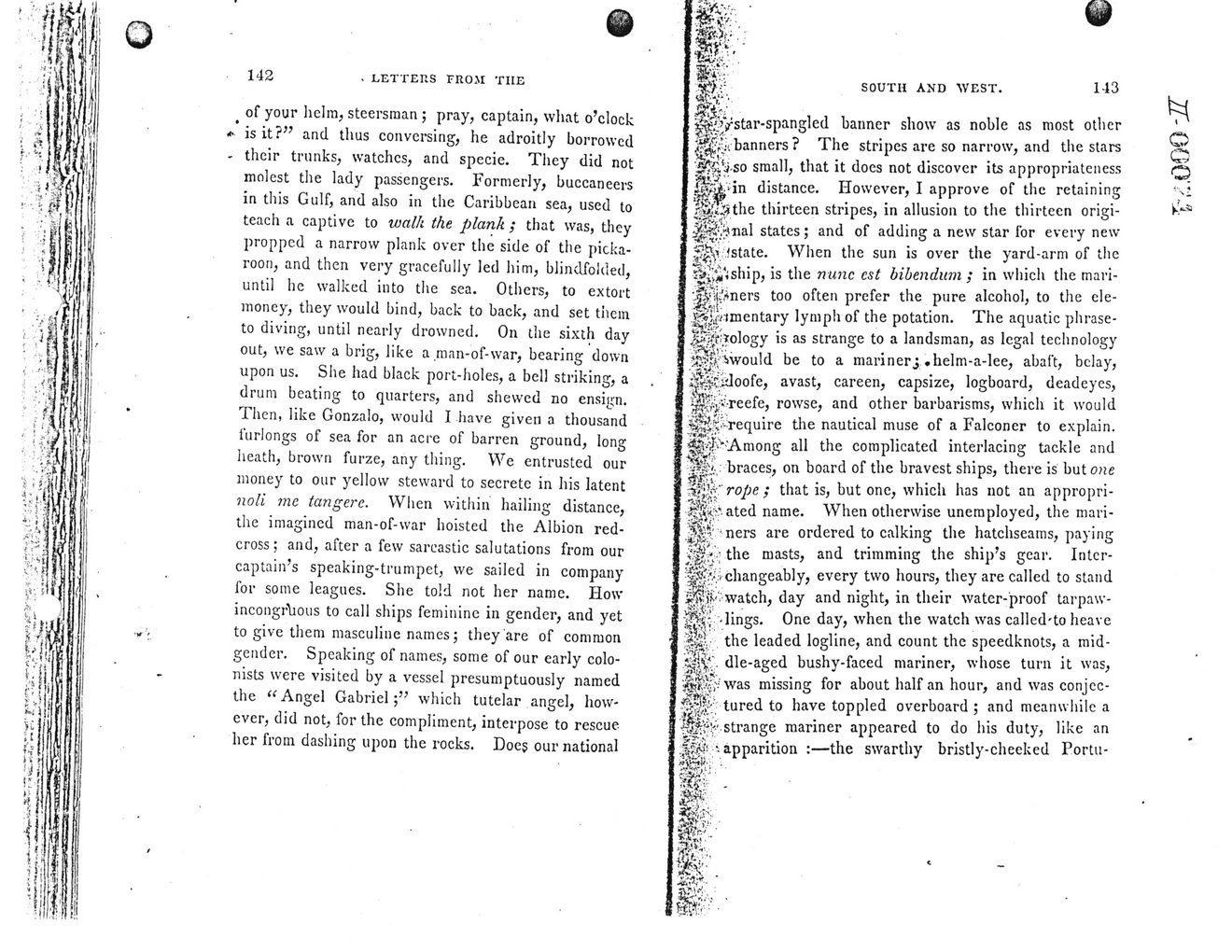This text was obtained via automated optical character recognition.
It has not been edited and may therefore contain several errors.
142 . LETTERS FROM THE of your helm, steersman ; pray, captain, what o’clock * is it?” and thus conversing, he adroitly borrowed - their trunks, watchcs, and specie. They did not molest the lady passengers. Formerly, buccaneers in this Gulf, and also in the Caribbean sea, used to teach a captive to walk the plank ; that was, they propped a narrow plank over the side of the picka-roon, and then very gracefully led him, blindfolded, until he walked into the sea. Others, to extort money, they would bind, back to back, and set them to diving, until nearly drowned. On the sixth day out, we saw a brig, like a man-of-war, bearing down upon us. She had black port-holes, a bell striking, a drum beating to quarters, and shewed no ensign. Then, like Gonzalo, would I have given a thousand furlongs of sea for an acre of barren ground, long heath, brown furze, any thing. We entrusted our money to our yellow steward to secrete in his latent noli me tangere. When within hailing distance, the imagined man-of-war hoisted the Albion red-cross; and, after a few sarcastic salutations from our captain’s speaking-trumpet, we sailed in company for some leagues. She told not her name. How incongrUous to call ships feminine in gender, and yet to give them masculine names; they are of common gender. Speaking of names, some of our early colonists were visited by a vessel presumptuously named the “ Angel Gabriel;” which tutelar angel, however, did not, for the compliment, interpose to rescue her from dashing upon the rocks. Does our national *-'3Y • • SOUTH AND WEST. 143 P^Vstar-spangled banner show as noble as most other banners ? The stripes are so narrow, and the stars 4a so small, that it does not discover its appropriateness m •in distance. However, I approve of the retaining Ip&jSthe thirteen stripes, in allusion to the thirteen origi-:|£Ky?'nal states; and of adding a new star for every new 'state. When the sun is over the yard-arm of the Sj^iship, is the nunc cst bibendum ; in which the mari-^t-’pners *:00 °^ten Prefer the pure alcohol, to the ele-.^//imentary lymph of the potation. The aquatic phraseology is as strange to a landsman, as legal technology j^P'WouId be to a mariner j «helm-a-lee, abaft, belay, ijj^iiloofe, avast, careen, capsize, logboard, deadeyes, l^-v-reefe, rowse, and other barbarisms, which it would ^ifcrequire the nautical muse of a Falconer to explain. ^j^VAmong all the complicated interlacing tackle and braces, on board of the bravest ships, there is buto?;e rope ; that is, but one, which has not an appropri-j^ifeated name. When otherwise unemployed, the mari-li^ners are ordered to calking the hatchseams, paying the masts, and trimming the ship’s gear. Intcr-fpchangeably, every two hours, they are called to stand watch, day and night, in their water-proof tarpaw-•^1-lings. One day, when the watch was called'to heave fjiv the leaded logline, and count the speedknots, a mid-dle-aged bushy-faced mariner, whose turn it was, Ij^'was missing for about half an hour, and was conjec-$3$* tured to have toppled overboard ; and meanwhile a strange mariner appeared to do his duty, like an apparition :—the swarthy bristly-cheeked Portu-

Hancock County Letter-from-Gulf-of-Mexico-(6)